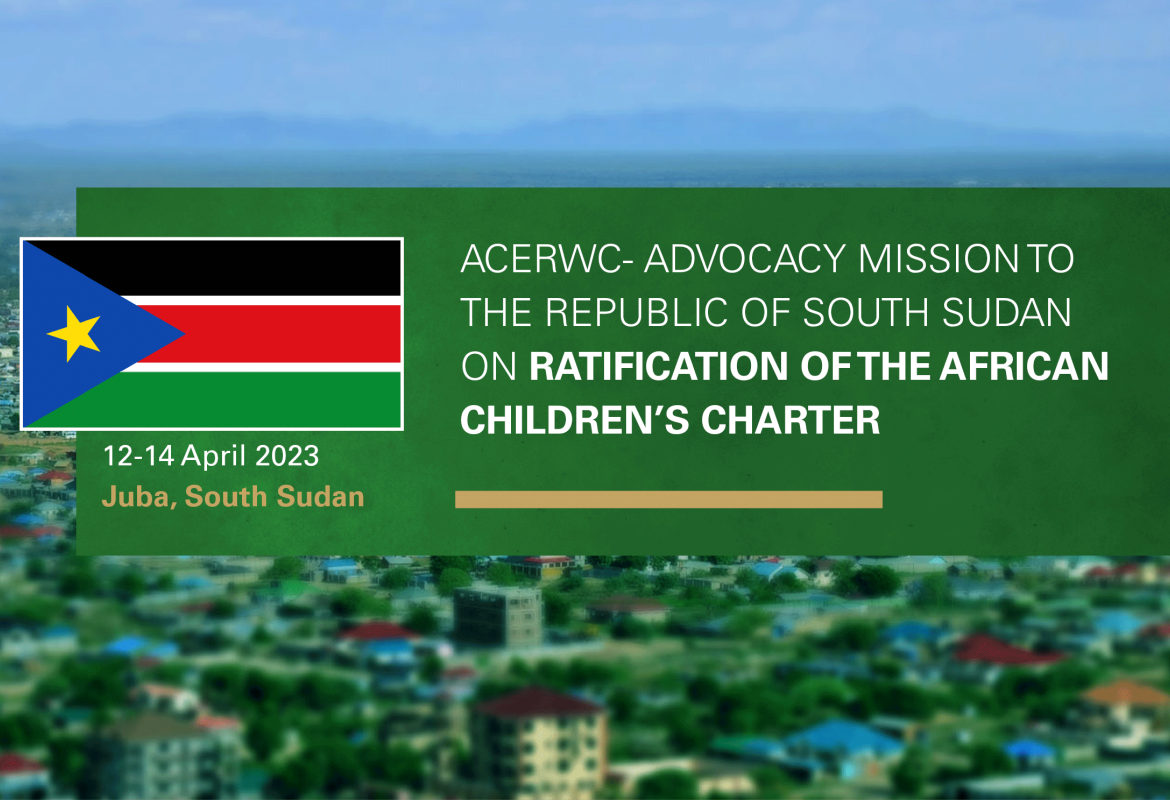The ACERWC concluded its advocacy mission in South Sudan for the ratification of the African Charter on the Rights and Welfare of the Child. The mission was held from April 12 to 14, 2023. The main objectives of the advocacy mission were to remind and sensitize the Government of South Sudan about the importance of ratifying the Charter; to obtain a firm commitment and time frame for South Sudan to ratify the Charter; to identify the reasons for non-ratification and to provide recommendations on how to address the identified challenges; to clarify the practical steps of ratification of the Charter and ensure assistance in the process; to meet and build networks with various CSOs and other stakeholders who can follow-up on the implementation of the recommendations.
To this end, the Delegation engaged in extensive stakeholder consultations, including with the Ministry of Gender, Child and Social Welfare, the Ministry of Education, the Ministry of Health, the Ministry of Interior; the Ministry of Foreign Affairs; and the Specialized Committee on Gender, Child, Social Welfare and Religious Affairs in the Parliament. The Delegation also discussed in-depth with Children’s Representatives and child parliamentarians, Save the Children International, Plan International, UNICEF, and the Child Rights Coalition in South Sudan. To conclude the mission, the ACERWC held a one-day consultative workshop with the aforementioned child rights stakeholders in South Sudan, as well as UNHCHR and South Sudan’s Human Rights Commission representatives. During the Workshop, the participants brainstormed ideas for expediting the Charter’s ratification, implementing the Committee’s recommendations from its 2014 investigations mission on children affected by armed conflict, as well as addressing other major child rights concerns in South Sudan.
From the extensive consultations it held with various stakeholders, the Committee notes with great appreciation that the Republic of South Sudan has made significant progress in protecting and promoting the rights of and welfare of children in South Sudan. In terms of ratification of the Charter in particular, the Committee observes that there is a strong political will to ratify the Charter, which has been explicitly expressed by government representatives, as well as other stakeholders.
In addition, the Committee commends the government of South Sudan for establishing a children’s parliament, juvenile courts, and one-stop centers in Juba; expanding access to free primary education in public schools; implementing a back-to-school program for pregnant girls, and ensuring inclusivity in all schools to ensure that children with and without disabilities attend the same schools. The Committee further commends the government for developing the Strategic Plan on Ending Child Marriage and taking measures to prevent the recruitment of child soldiers and the occupation of schools and hospitals by armed forces.
Despite these encouraging indicators and trends, the Delegation noted areas of concern during its advocacy mission. One source of concern is that, while the process of ratifying the Charter was nearly complete, with only the signature of the President remaining, a delay in the process to ensure that the Charter is ratified by the government of South Sudan was observed. As a result, the Committee emphasizes the need to prioritize and expedite the ratification of the Charter and the domestication and implementation of its provisions at the national and municipal levels, which calls for renewed urgency on the part of all relevant stakeholders.
Furthermore, while the Committee acknowledges the progress made in implementing the recommendations from the 2014 report, it is still very concerning that children are leaving school in some communities to marry, that child pregnancies and deliveries are associated with a high mortality rate, that there are many internally displaced children, and that many South Sudanese children are refugees. The Committee has also identified additional gaps from the various consultations it had with various stakeholders, including the delay in revising the Child Act and failure to consult child rights stakeholders in the constitutional-making process to ensure that children's rights are taken into consideration. The Committee has also observed that a Child Commission is yet to be constituted.
The ACERWC will be releasing a comprehensive report on the findings of the mission including recommendations which will then be available on its website.







